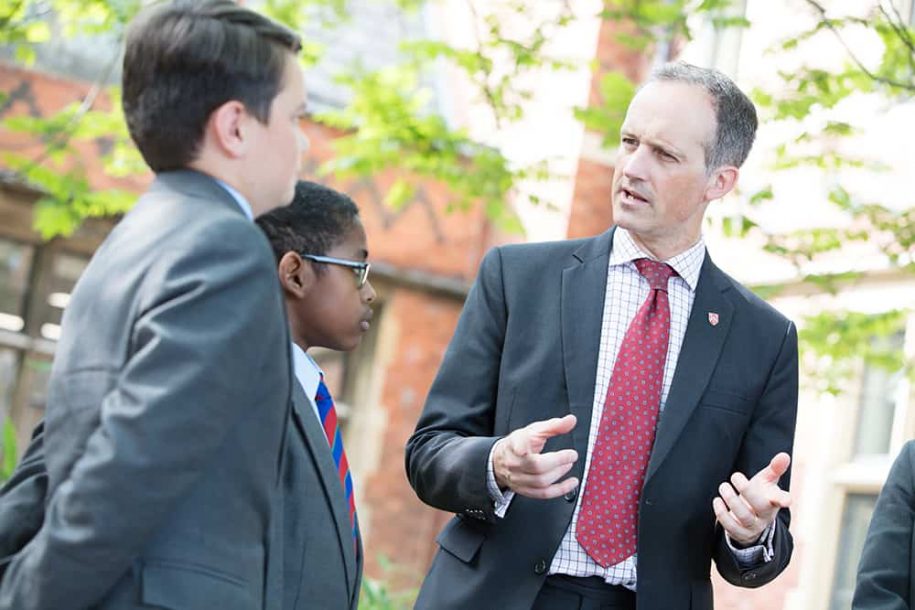The Great Grammar School Debate

Shortly after Theresa May became Prime Minister last summer, the Government announced that it would explore the creation of new grammar schools throughout the country. This has contributed to some polarising debate in political circles, and the national press has been full of articles on the rights and wrongs of this approach ever since.
One of these articles appeared in the Times in September and was illustrated with a beautiful photo of the Loughborough Grammar School quad bathed in sunshine. While I was delighted to see the Grammar School featured on page nine of a national newspaper, it highlighted the lack of understanding of the issue across the country, as we are, of course, not a <u>real</u> grammar school any more but an independent school.
Grammar Schools existed from the 1940s to 1970s in all regions, with pupils selected through the infamous 11+ Examination on the basis of academic achievement. Those unsuccessful in the 11+ attended Secondary Modern schools instead. The Wilson government of the late 1960s was determined to end the perceived inequality of this system, and the comprehensive school was introduced to replace this selectivity. Some areas, however, such as Lincolnshire, Buckinghamshire and Kent voted to retain grammar schools, which thrive to this day.
The basic arguments for and against grammar schools are fairly clear. Supporters of selective schools cite that they are a driver of social mobility, because bright children from families of modest means can benefit from high expectations and excellent teaching – in other words the benefits of independent schools like LGS, but without the fees. Those against grammars stress that this is not the reality. Instead, to them, grammar schools become bastions of middle-class privilege, as parents buy their children intense tutoring in the run-up to the 11+ to ensure that they are as well-prepared as humanly possible. In addition, they claim that 11 is too young to select pupils by ability and that this again favours those who come from comfortable social backgrounds. Many commentators claim (with some justification) that comprehensives in areas with a grammar school are often poor because the most motivated pupils have been removed and placed in grammar schools.
The Times article to which I referred took this line. What irked me at the time was the caption underneath the photo of LGS: “Grammar Schools, like Loughborough, are seen as socially divisive”. I was pleased that The Times printed my letter of correction the next day in which I explained that we had been an independent school for some time and had retained the name ‘Grammar School’ only in deference to our traditions of 500 years. (We are hardly alone: Manchester, Leicester, Portsmouth, Leeds and Bradford Grammar Schools are also independent.) I also objected to the accusation that we are divisive! The criticism that state grammar schools lack diversity is probably a fair one (only 2% of pupils are eligible for free school meals compared to a national average of 15%). However, most independent schools are actually much more varied in terms of pupils’ backgrounds owing to scholarships and means-tested bursaries, in line with the charitable intentions of our founders in the Fifteenth Century.
So in which direction will the country go? The world of education is, on the whole, against the expansion of grammar schools. Teachers are a pretty left-wing bunch and do not appreciate the idea of privilege, which is why independent schools often get such a negative press. The former Headmistress of Cheltenham Ladies’ College, Vicky Tuck once said that she was made to feel ‘slightly immoral’ for running a fee-paying school and I understand what she means. The existing 164 grammar schools may well be part of the maintained school sector, but they are also subject to the same criticism of elitism. Certain sections of the media and many MPs will fight aggressively to prevent grammar schools being introduced. Loughborough’s MP, Nicky Morgan, the former Education Secretary, is known to be against the plan.
On the other hand, Theresa May seems to be personally committed to the revival of grammar schools, as she is convinced that they will give improved opportunities to intelligent working-class children. She is currently in a powerful position in government, as a newly chosen Prime Minister with an opposition Labour Party in disarray and this initiative will be difficult to stop if she is determined to push it through.
It therefore all comes down to political will. Will the complications of Brexit mean that grammar schools cannot be prioritised? Or will the controversy of leaving the EU mean that school reform passes beneath the radar? If Mrs May gets her way, the educational landscape of the country will change significantly, and there would be the risk of an almighty scrum as schools compete to become <u>the</u> grammar school for a particular area, knowing that, otherwise, they would risk becoming the <em>de facto</em> second-tier establishment. You can guarantee that the Loughborough Endowed Schools will be keeping a very close eye on developments!
